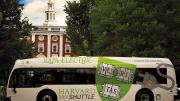Crimson green
A sleek Tesla it is not, but this fully electric bus, in its new Harvard livery, is the first of four to enter Campus Services’ fleet. Replacing bio-diesel-fueled vehicles, the 35-foot newcomers seat 29 passengers, and run on a 450 kWh battery. A Massachusetts Department of Environmental Protection grant program funded the purchase, part of a larger effort to electrify transportation in the Commonwealth. Harvard loan funds paid for fast-charging stations for the buses’ batteries, so the vehicles can be recharged in three hours nightly, at a facilty in Allston. The electric vehicles are expected to reduce emissions of greenhouse gases by 220,000 pounds annually.
Campus Chief
Purnima Kapur has been appointed chief of university planning and design, responsible for developing an integrated, Harvard-wide campus plan—including Cambridge, Allston, the Longwood Medical Area, and the Arnold Arboretum. She is organizing a University Planning and Design Office, reporting to executive vice president Katie Lapp, which will incorporate the current planning office and Allston initiatives, in an effort enhance and make the most of all University physical assets in support of the academic mission. Kapur was most recently executive director of New York City’s planning department.
Adios Oberon
The American Repertory Theater has announced it will not renew its lease, ending December 31, at the 2 Arrow Street venue where it has operated OBERON as a second stage for theatrical, musical, and club production. The ART cited both the near-term impact of the pandemic, and its longer-range planning for its ultimate relocation to a new home on North Harvard Street in Allston.
Law Lineup
Harvard Law School announced that the J.D. class which matriculated this year is both its most diverse and, measured by test scores and grade-point averages, its most accomplished. According to the school, 56 percent of the 560 members of the class of 2024 identify as people of color, and 54 percent as women. The average undergraduate GPA was 3.92, and the average LSAT was 174, both record highs.
The Divided Case for College
Yet another survey confirms public opinion about higher education has become highly polarized. A September report, “Is College Worth the Time and Money?”, commissioned by the Bipartisan Policy Center and the Association of Amereican Colleges and Universities, reveals that 70 percent of Democrats surveyed say college is “definitely” or “probably worth it”—while only 53 percent of Republicans concur. On the other hand, 21 perent of Democrats, and 35 percent of Republicans, say a college degree is definitely or probably not worthwhile. For the record, 87 percent of employers say a degree or equivalent credential is definitely or probably worthwhile.
Nota Bene
Planning ahead. According to the Harvard Crimson’s freshman survey, slightly more than half of the class of 2025 respondents said they had a LinkedIn account. Revealingly, “Freshmen who reported that they wanted to go into consulting, technology, and entrepreneurship had the highest rates of LinkedIn accounts, at 84.6 percent, 72.4 percent, and 76.6 percent, respectively.”
Notable books. Among nonfiction works long-listed for the National Book Award in September were three by authors of interest in these pages: Bass professor of English Louis Menand, The Free World (“Culture in the Cold War,” March-April, page 8); professor of history Tiya Miles, All That She Carried (see harvardmag.com/tiya-miles-21); and Clint Smith, Ph.D. ’20, How the Word Is Passed (reviewed on page 57 of this issue). Winners will be announced November 17. [As of early October, the Menand and Smith titles were eliminated for further consideration; the Miles book remained a candidate for the NBA.]
Naming opportunity. The Morningside Foundation, the family charity associated with investor Gerald Chan, S.M. ’75, S.D. ’79, which in 2014 made a $350-million naming gift to the Harvard T.H. Chan School of Public Health (see harvardmag.com/350-gift-14), in September made a $175-million gift to the University of Massachusetts Medical School, in Worcester—the largest in UMass history. It doubles the UMass Chan Medical School’s endowment.
Nobelist moves west. Jack Szostak, professor of genetics and of chemistry and chemical biology, who shared the 2009 Nobel Prize in Physiology or Medicine, will join the faculty of the University of Chicago as a University Professor effective next September. His work was profiled in “How Life Began” (July-August 2019, page 40).
Miscellany. Biddy Martin, a member of the Harvard Corporation since 2018, has announced that she will step down from the presidency of Amherst College at the end of the academic year, concluding 11 years of service there.…Marcella Alsan ’99, M.P.H. ’05, Ph.D. ’12,professor of public policy at the Kennedy School, has won a MacArthur Fellowship.









